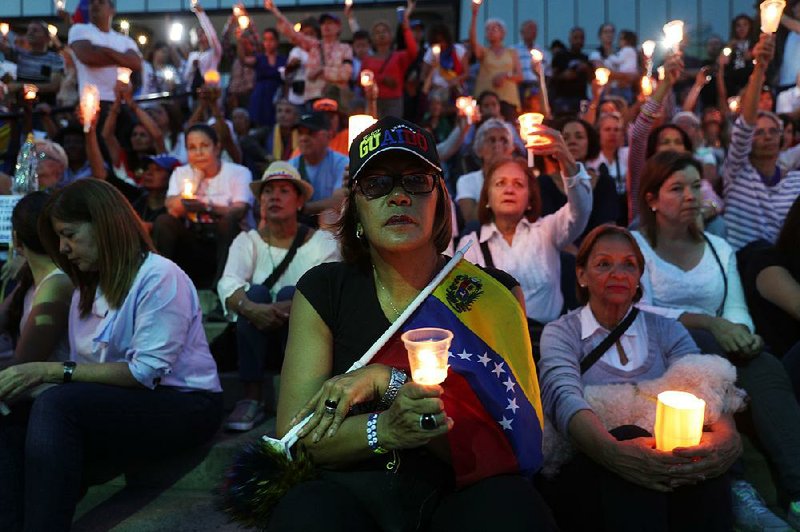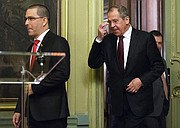WASHINGTON -- Secretary of State Mike Pompeo on Sunday confirmed that President Donald Trump's administration is making contingency plans for U.S. military intervention in Venezuela.
When asked directly on ABC's This Week whether Trump believes he has the power to intervene militarily without seeking approval from Congress, Pompeo declined to answer.
"I don't want to speak to that," Pompeo said, pointing to the powers granted to the president under the Constitution. "The president has his full range of Article 2 authorities, and I'm very confident that any action we took in Venezuela would be lawful."
The discussion came after Venezuelan opposition leader Juan Guaido tried but failed last week to oust President Nicolas Maduro by rallying the Venezuelan military to his side. Guaido said any offer of U.S. military aid would be sent to the Venezuelan parliament for a vote.
Guaido, the head of Venezuela's National Assembly, declared himself interim president in January, saying Maduro's re-election last year was rigged and was part of a series of increasingly authoritarian steps taken since he replaced the late Hugo Chavez in 2013.
Pompeo said Sunday that the U.S. has "a full range of options that we're preparing for -- diplomatic options, political options, options with our allies, and then ultimately, a set of options that would involve use of U.S. military. We're preparing those for [the president] so that when the situation arises, we're not flat-footed."
Pompeo, when asked why the Maduro regime wasn't toppled last week by Guaido and the opposition, said it would happen eventually.
"These things sometimes take time," Pompeo said on Fox News in an interview with Chris Wallace. "We know it's going to happen. Chris, I am not going to talk about all the various conversations that have taken place. We continue to work with leaders down there. ... If you think about where this country was 90 days ago, the Venezuelan people should be very proud. They are much closer to having democracy restored."
Pompeo said Maduro can't feel good about his situation, arguing that there is a difference between ruling Venezuela and governing it.
"There's enormous poverty, enormous starvation, sick children that can't get medicine," Pompeo said. "This is not someone who can be part of Venezuela's future."
As a candidate, Trump questioned the logic of committing the U.S. military to more conflicts abroad. But his administration has adopted a more hawkish stance with the ascent of Pompeo and Trump's national security adviser, John Bolton.
Bolton and Pompeo both said last week that the Kremlin talked Maduro out of leaving Venezuela after Guaido called for a military uprising. In another Sunday morning appearance, Pompeo rejected the notion that Trump had a different view of the situation when he said Russian President Vladimir Putin "was not looking to get involved in Venezuela."
"No difference, no difference," Pompeo said on CBS' Face the Nation. "The president has said, I think he in fact tweeted, that the Russians must leave Venezuela. ... The president's been very clear, we want the Cubans out. There are Iranians on the ground there. We want the Russians -- we want everyone out so that the Venezuelan people can get the democracy they deserve. That includes Mr. Maduro leaving."
Pompeo declined to put a timeline on when the Venezuelan opposition might hope to achieve that outcome. But the top U.S. diplomat is on his way to Europe in the coming week, where he is scheduled to meet with Russian Foreign Minister Sergey Lavrov as well as other top European officials, in part to discuss the situation in Venezuela.
Lavrov met with Venezuela's foreign minister, Jorge Arreaza, in Moscow on Sunday and said afterward that he hoped U.S. talk of a military option does "not reflect the intentions" of Trump. Russia has accused the United States of aggressively interfering in Venezuela's affairs.
"We call on both the Americans and those who support them to drop irresponsible plans," the Russian foreign minister said.
VIGIL IN CARACAS
Guaido plans to continue to reach out to Maduro loyalists, combining that effort with international pressure and street protests, though those protests led to at least five deaths last week.
Several hundred Venezuelans in Caracas said prayers Sunday at a candlelit vigil for the victims from street clashes on Tuesday and Wednesday between police and protesters. The victims included two teenage boys.
Guaido was unable to attend the vigil because of meetings, a representative told the crowd. The representative did not elaborate, though he noted that some members of the opposition-controlled National Assembly were at the memorial service.
Some of those who gathered waved Venezuelan flags and chanted "Freedom," but the mood was muted after what the opposition acknowledges was a major setback in its campaign to topple Maduro.
Venezuelans who want political change must keep protesting in the streets, said David Manrique, a 20-year-old student.
"A lot of people have had faith in the political process, which hasn't brought results, or at least the results that we want," he said.
Venezuela has been in sharp decline for years, suffering from hyperinflation and shortages of food and medicine that the opposition blames on state corruption and mismanagement by the socialist administration.
For his part, Maduro says U.S. sanctions aimed at forcing him from power are taking a toll on the economy, and his government accused Guaido of fomenting violence by appealing to the military to switch sides.
Despite its accusations, Maduro's government has not moved to arrest Guaido, who has the support of more than 50 world governments.
Also on Sunday, Venezuelan authorities were investigating the cause of a helicopter crash that killed seven military officers while they were heading to a state where Maduro was visiting troops.
The Cougar helicopter crashed on the southeastern outskirts of Caracas on Saturday. The armed forces said the helicopter was heading to San Carlos in Cojedes state, near a military base where Maduro addressed cadets.
Information for this article was contributed by Karoun Demirjian and Paul Sonne of The Washington Post; by Christopher Torchia and Jim Heintz of The Associated Press; and by Mark Niquette, Laura Litvan, Ben Brody and Jose Orozco of Bloomberg News.
A Section on 05/06/2019

